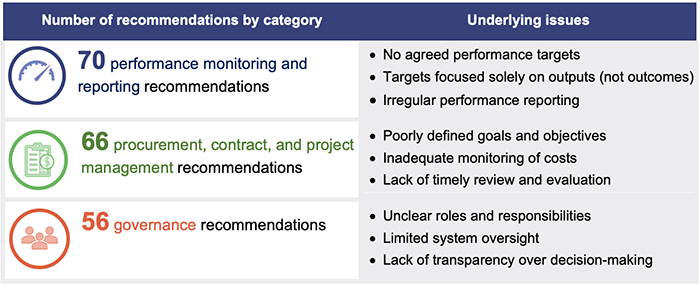This is a common question about the work that we do at Queensland Audit Office (QAO).
We make recommendations in our reports to parliament to help entities improve the services they deliver and for them to learn from the better practices of others. Ultimately, we want better public services for Queenslanders.
A good recommendation must address the root cause of an issue and it must be client‑focused, meaning we tailor it to the specific needs and context of the entity and its business practices. A recommendation that is vague, impractical, or that only addresses the symptoms of an issue, is unlikely to result in better public services.
We consult with entities when developing our recommendations and we ask them to confirm whether they agree with them. However, we cannot force entities to implement them.
To get a more complete picture of the progress that entities are making, we ask them to report on what they have done to implement our recommendations. In our report 2022 status of Auditor-General’s recommendations (Report 4: 2022–23), we asked entities to report on their progress addressing the recommendations we made in 2018–19 and 2019–20, and any outstanding recommendations from last year’s inaugural report. We asked 56 entities to report on their progress implementing 454 recommendations from 34 reports to parliament.
Entities reported fully implementing 64 per cent of our recommendations, partially implementing 29 per cent, and not implementing 3 per cent. They also reported that 4 per cent of recommendations were no longer applicable to them.
What insights did we get from entities' responses?
Although we examine many different aspects of public service delivery via our audit program, the same issues often emerge, resulting in similar or persistent recommendations. We grouped our recommendations into 10 categories and analysed them to identify the ones we made most often. The figure below shows the 3 most common categories of recommendations that we made and the underlying issues we sought to address.
We also analysed which categories had the highest number of outstanding recommendations. The most common type related to governance, followed closely by performance monitoring and reporting.
Entities need good governance. It promotes accountability, integrity, and transparency, and can help them continuously improve. Regardless of these benefits, we found that 32 per cent of the 56 governance recommendations we made were still outstanding.
A cornerstone of good governance is accurate and timely reporting. We are frequently recommending that entities enhance their performance monitoring and reporting practices. These recommendations are not normally difficult, time consuming, or costly to implement. Despite this, we found that 21 per cent of the 70 recommendations we made were still outstanding.
These are just some of the insights that we gained from entities’ responses this year. You can find out more by reading our report, and also by taking a look at our interactive dashboard. This dashboard allows you to more deeply explore entities’ self-assessed progress in implementing our recommendations. You can tailor your search across different fields including report, entity, and parliamentary committee.
What are our next steps?
Next year, we will ask entities to report against recommendations from our 2020–21 and 2021–22 reports, and any recommendations that are still outstanding from previous years.
We do not audit entities’ self-assessments, and therefore cannot provide assurance over their responses. But we do use the information we obtain, along with our other monitoring processes, to inform our forward work plan each year and determine which follow-up audits we will undertake. These follow‑up audits help provide assurance about the progress entities are making implementing the recommendations we made in specific reports to parliament.
Our 2022 status of Auditor-General’s recommendations report is an important part of our work to help improve accountability and performance across Queensland’s public sector and local government entities. It emphasises the importance of these entities accepting the need for change and considering past experiences or the experiences of others. Real change comes from the resolve and actions of entities through a culture of learning and self-improvement.

